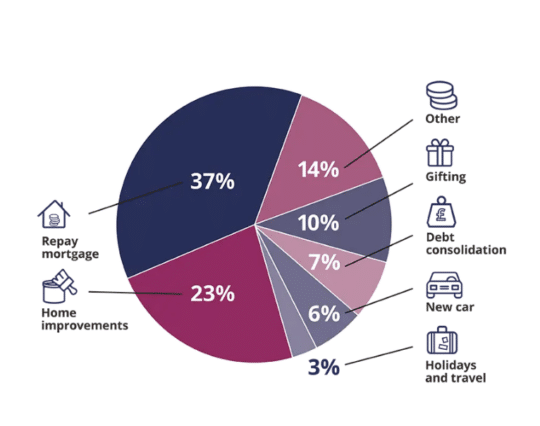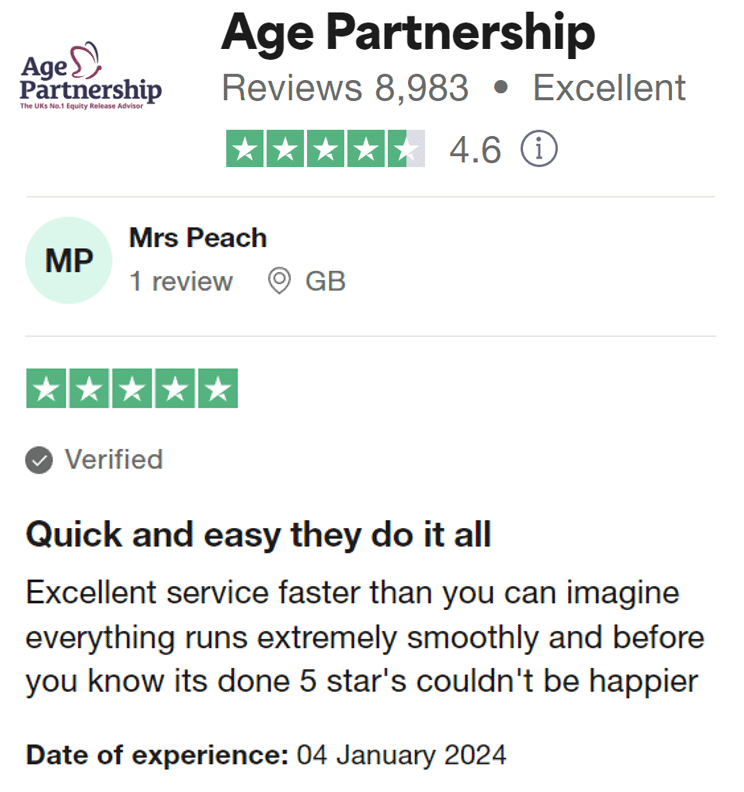Disadvantages of Equity Release – What You Should Know
Our preferred equity release adviser is Age Partnership. For free and impartial money advice you can visit MoneyHelper.

Our preferred equity release adviser is Age Partnership. For free and impartial money advice you can visit MoneyHelper.
Are you eager to learn more about equity release? You’ve come to the right place for answers. This article aims to guide you through the key points you should know about equity release. Each month, over 7,000 people turn to our website for advice on this subject.
We understand that the process of equity release can seem daunting and confusing. It’s a big decision, and you may have many questions, which is why we’re here to help.
In this article, we will:
- Explain what equity release is and how it works.
- Discuss the potential risks and drawbacks, such as the chance of losing your home.
- Provide guidance on how to get a realistic quote.
- Explore whether equity release is a good idea for you.
- Talk about what happens after death if you have equity release.
The Centre for Ageing Better’s study reveals that a million homes in the UK need changes to be better fit for living comfortably, and a third of these homes have someone over 55.1 This is why knowing how equity release works and its disadvantages is crucial.
We have a deep understanding of your concerns and questions. So, sit back, relax, and let us guide you through the details of equity release.
Are there any cons of equity release?
The FCA reports that many lifetime mortgages work well for consumers, especially those who couldn’t afford traditional mortgages or borrowing.
However, some lifetime mortgages do not work out well for consumers, often because they weren’t informed enough before they applied.2
It’s also important to mention that both lifetime mortgages and reversion schemes have some disadvantages, such as the long-term cost of equity release, eye-watering early repayment charges, impact on state benefits, implications on inheritance, and more.
We discuss the main cons of equity release below.
» TAKE ACTION NOW: Fill out the short debt form
What are the disadvantages?
The main cons of equity release are:
- Overall cost
The overall cost of any equity release plan is expensive over the long term. Releasing just £65,000 through a lifetime mortgage at a standard 6.4% interest rate will equate to almost £137,000 total debt after just 12 years. This means the value of your home left to beneficiaries can be severely reduced.
It’s also mandatory to get professional advice and legal services, which add to the total cost of the process.
- Early repayment charges
These schemes are designed to last for the rest of your life and it is therefore very expensive to try and get out early. The early repayment fees on a lifetime mortgage are exceptionally expensive, usually more so than other mortgages.
- Losing means-tested state benefits
Accessing part of your home equity as a lump sum will instantly increase the amount of savings you hold.
This may affect your entitlement to some means-tested state benefits.
We should clarify that equity release doesn’t impact your state pension, which is a standard amount for everyone. However, it could affect your Pension Credit if you’re a low-income earner, as it’s means-tested.
If you do, you could lose your entitlement to a council tax reduction. Anyone with more than £16,000 in savings won’t be eligible to receive Universal Credit either. This will depend on other personal circumstances such as disabilities. Consulting with a financial advisor is the best way forward.
Equity Release Do’s and Dont’s
As we delve into the details of equity release, we know how important it is to have clear guidance. That’s why we’ve put together this table that outlines the do’s and don’ts of equity release.
If you want to learn more about equity release, including its advantages and disadvantages, be sure to read our specialized guide.
| Equity Release – DO… | Equity Release – DON’T… |
| DO Use equity release to fund sensible investments like home improvements, debt consolidation, helping family members. | DON’T Use equity release to invest in a risky scheme, to please family members pressuring you, to make a luxury purchase or holiday. |
| DO Seek professional advice from professionals who specialize in equity release. | DON’T Rush into a decision. Take your time, you are in control on this. |
| DO Understand the difference between lifetime mortgages and home reversion plans – and which is best for you. | DON’T Use equity release without fully understanding the terms. |
| DO Check for flexibility – look for plans that let you be flexible, like making partial repayments. | DON’T Forget to look at alternative options for raising funds. |
Remember to take your time to fully understand the terms of equity release. This way, you’ll make the right choice for your needs.
How equity release could help
More than 2 million people have used Age Partnership to release equity since 2004.
How your money is up to you, but here’s what their customers do…
Find out how much equity you could release by clicking the button below.
In partnership with Age Partnership.
Equity release isn’t the only option out there!
While equity release can be a wonderful option for many homeowners trying to free up some cash, it’s not the only option out there. You could look into other options like:
- Downsizing
- Taking out a regular loan
- Tapping into pensions and savings
- Asking friends and family for some help
But, what are the advantages of equity release?
From my experience, the advantages of equity release from a member of the Equity Release Council are:
- Tax-free lump sum or drawdown with no monthly repayments
- Voluntarily keep the debt lower with repayments if desired
- Spend the money on anything you wish
- You’ll never be forced to sell or move out; you’ll only have to sell after you die or move into care
- You have the right to move home and take your lifetime mortgage with you
- You never owe more than what your home sells for, protecting the rest of the value of your estate
- You can ‘ring fence’ some of your property value for beneficiaries
- A downsizing clause will allow you to downsize and pay off some of your lifetime mortgage without having to pay early repayment fees
Join thousands of others who release equity
Age Partnership have helped over 2 million people release equity from their home.

Mrs Wareham
“I am more than pleased to have taken out Equity Release with Age Partnership.”
Reviews shown are for Age Partnership. Search powered by Age Partnership.
How to avoid the pitfalls of equity release
You can do five things to avoid the pitfalls of equity release. These are:
- Get independent advice from a financial services company that has experience working for clients in equity release.
- Tell your adviser about any future plans, such as plans to move home or downsize in the future.
- Only choose a lender that is regulated by the FCA.
- Only choose a lender that is a member of the ERC.
- Don’t rush into a decision and do your own research.
Is equity release a good or bad idea?
Equity release is neither a good nor bad idea for everyone.
The decision to use an equity release scheme should be based on personal circumstances. For some people with nobody to leave their estate to, it can be an easy decision, whereas, for others with children who could really benefit from inheriting a family home, it’s not such an easy decision.
If you’re thinking about equity release, make sure you use FCA-regulated lenders and seek independent financial advice for equity release.
Things to consider
Equity release will involve a home reversion or a lifetime mortgage, which is secured against your property and will reduce the value of your estate and impact funding long-term care. Our equity release partner, Age Partnership provides a personalised illustration to explain the full details. The money you release, plus the accrued interest is then repaid when you die or move into long-term care. Advice is required before proceeding with equity release and any existing mortgage must be repaid. Age Partnership provide initial advice for free and without obligation. Only if your case completes would Age Partnership’s advice fee of £1,895 be payable. Other lender and solicitor fees may apply.


